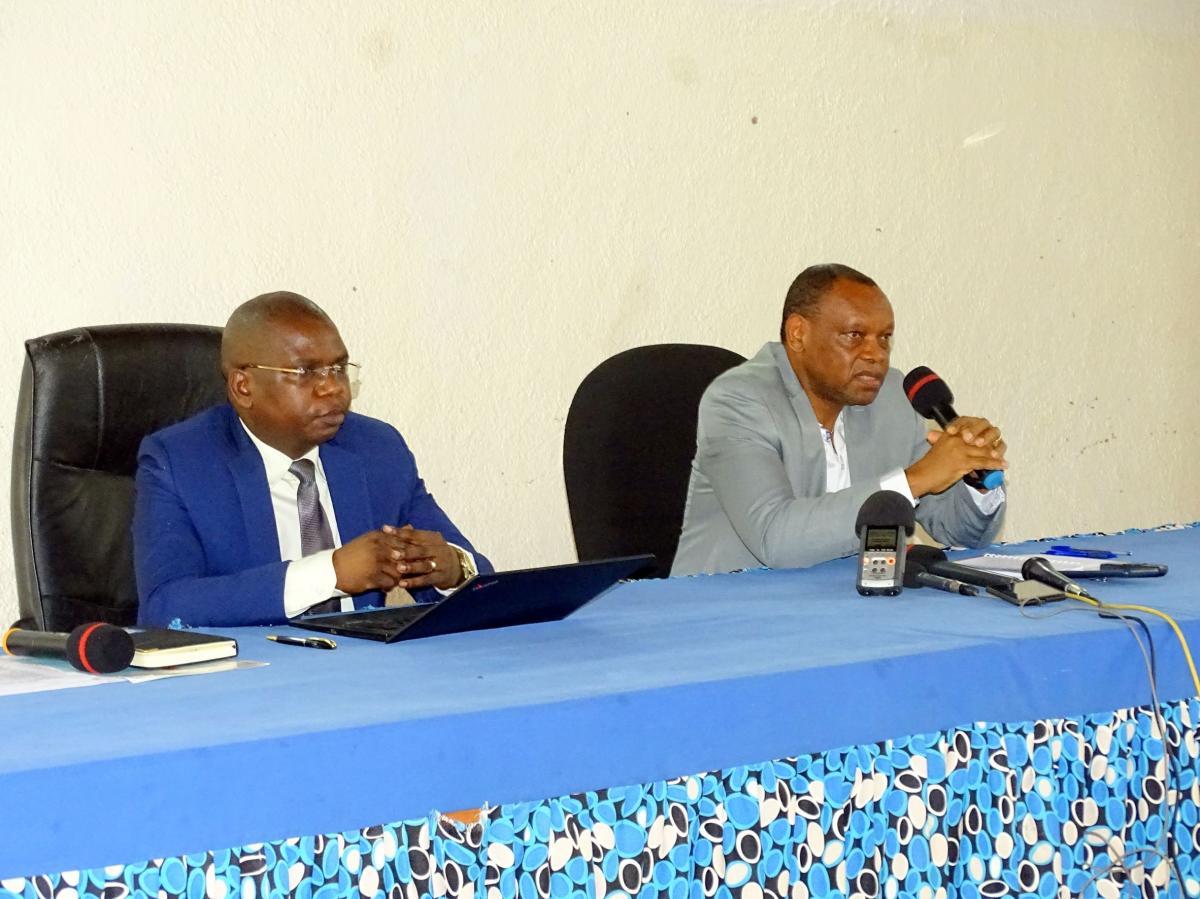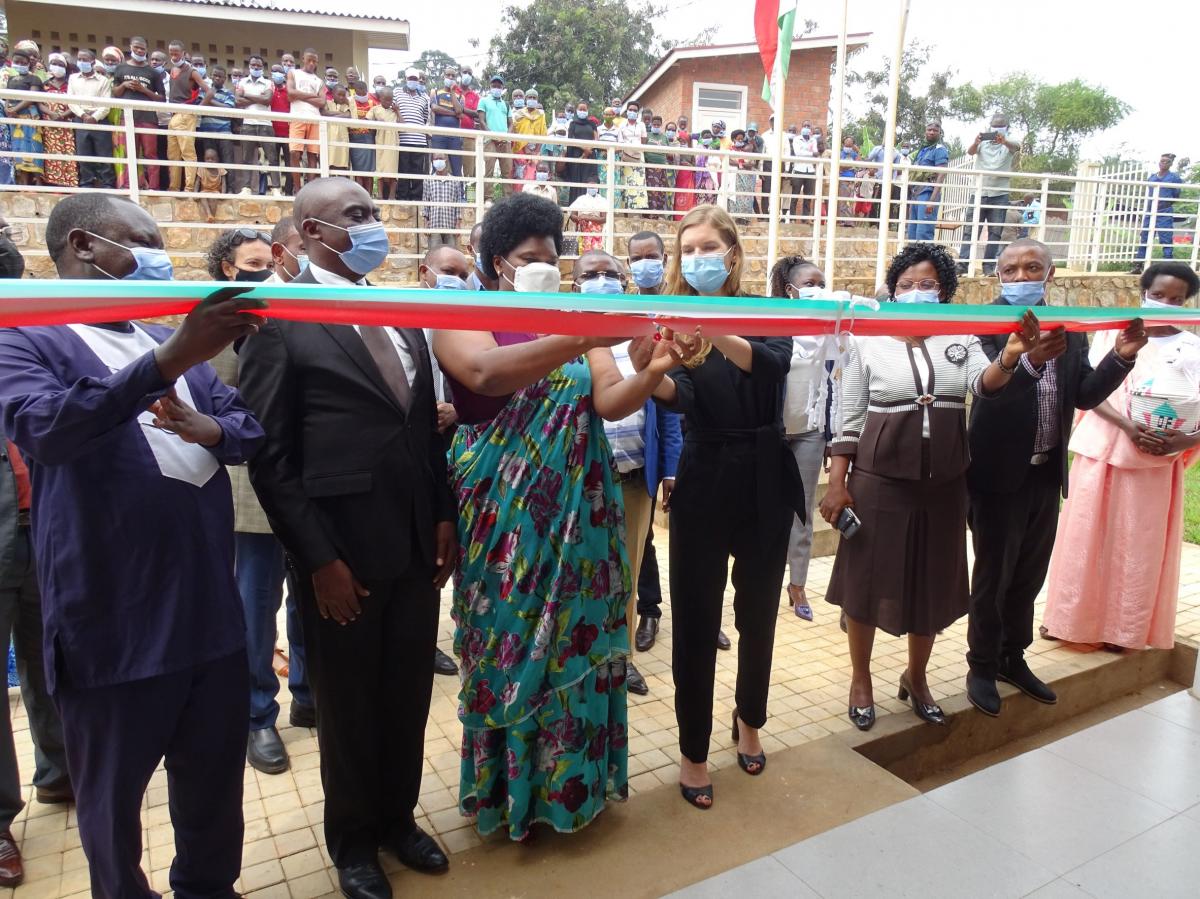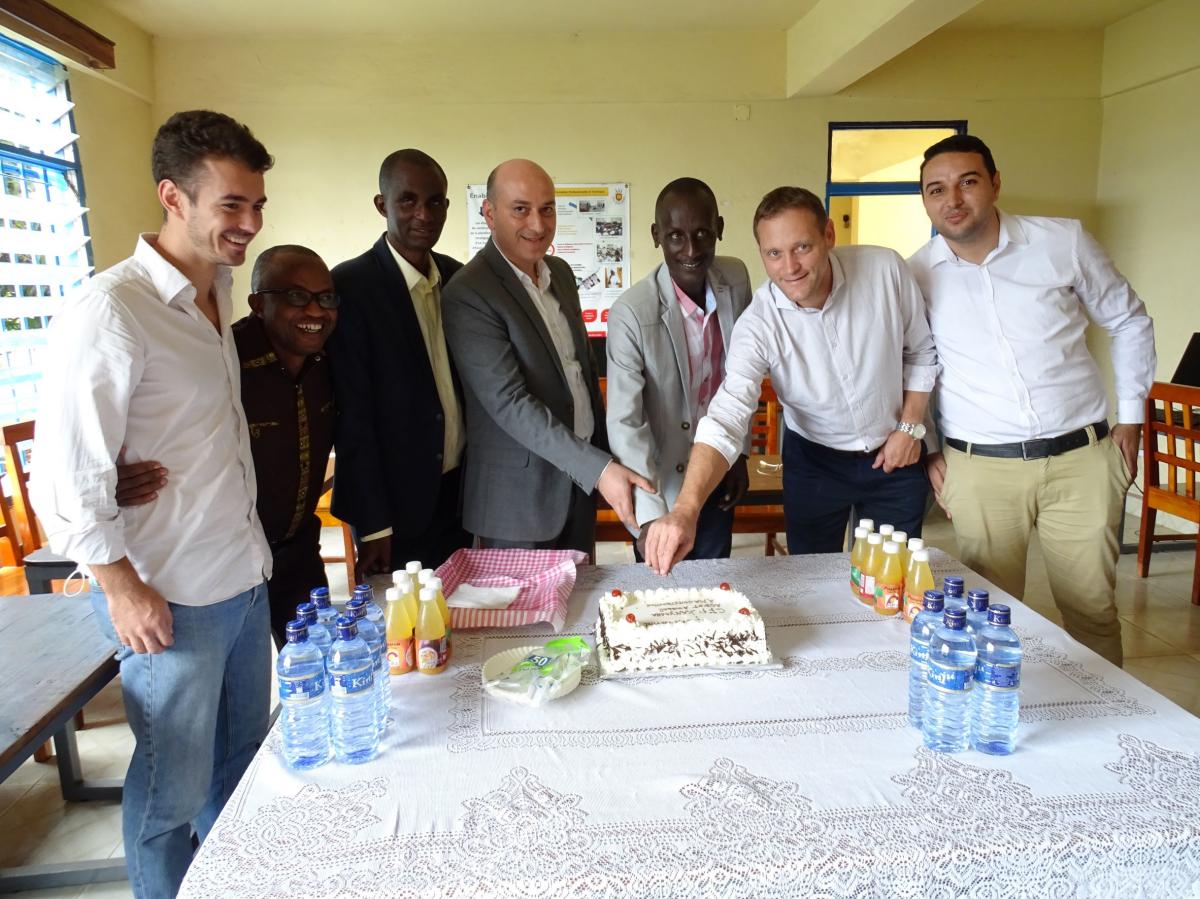Search
Viewing 1710 to 1725 of 3125 news
-
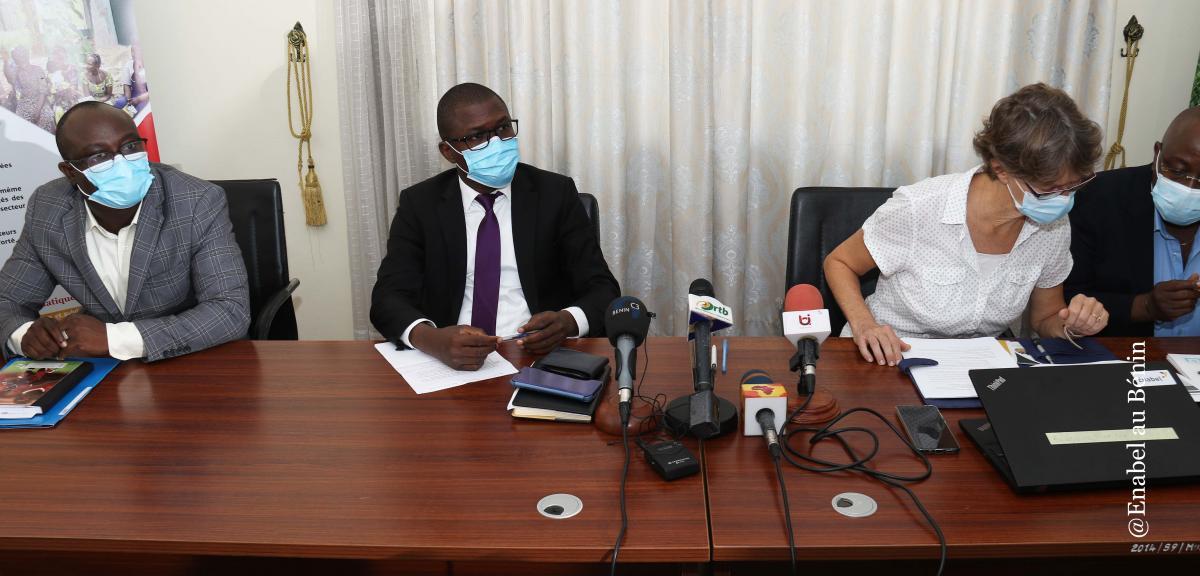
Bénin: Convention signée avec le Fonds national de développement agricole pour booster la filière ananas
Reece-hermine ADANWENON | 04/03/2022
Signée le 17 décembre 2020, la convention de subsides entre Enabel et le Fonds national de développement agricole (Fnda) entre dans sa phase opérationnelle.Une rencontre de démarrage a eu lieu le mardi 19 janvier 2021 à Cotonou. 37 agri-entrepreneurs de la filière ananas pourront disposer d’équipements productifs performants, grâce à un appui de l’Agence belge de développement (Enabel). Il s’agit de 19 transformateurs, 10 exportateurs et 8 fournisseurs de services (intrants, emballages, équipements, etc.) qui bénéficieront de la convention de subsides signée le 17 décembre 2020 entre Enabel et le Fonds national de développement agricole (Fnda). Visant à favoriser l’accès au financement des bénéficiaires, la convention entre dans sa phase opérationnelle et ce, pour une durée de 29 mois. L’atelier de démarrage a réuni ce, mardi à Cotonou, les parties prenantes. Portant sur un montant de 1 199 514 euros soit environ 786 millions F Cfa, l’appui s’inscrit dans le cadre du Programme de développement de l’entreprenariat dans la filière ananas (Defia) porté par Enabel et qui appuie près de 300 entrepreneurs agricoles, précise Wilma Baas, manager du Programme Defia.« Accroître durablement les investissements productifs des agri-entrepreneurs de la filière ananas à travers des financements adaptés et plus abordables », tel est l’intitulé de la convention, rappelle-t-elle. Cet appui devra permettre aux bénéficiaires de développer leurs activités, améliorer leurs revenus et générer des emplois durables, poursuit-elle. Valère Léonard Houssou, directeur général du Fnda, se réjouit de la confiance placée en sa structure pour favoriser la mise en place du dispositif d’accès au crédit au profit des acteurs de la filière ananas. Il assure que ce partenariat sera « fructueux » pour la compétitivité de la filière et le bonheur des acteurs. « C’est le début d’un partenariat que nous comptons renforcer dans le temps », ajoute-t-il. Mode opératoire La convention de subsides d’Enabel vise la mise en place d’un mécanisme de subvention d’investissement adossée au crédit, accompagné d’actions de professionnalisation du Fnda, indique Wilma Baas, manager du Programme Defia. Ce mécanisme sera mis en œuvre par neuf structures de financement : six systèmes financiers décentralisés (Sfd) et trois banques, partenaires de Defia et de Fnda, détaille Waly Clément Faye, assistant technique international auprès de Defia. Elles recevront les fonds qui seront versés par tranches par Defia au Fnda et les positionneront dans les comptes ouverts par les promoteurs. Ces derniers devront satisfaire aux conditions préalables telles que la contrepartie mobilisée, l’accord de l’institution financière pour le crédit complémentaire et d’autres documents. En attendant, l’équipe de coordination s’affaire, selon l’agenda du premier trimestre (janvier-mars), à l’élaboration des documents et outils d’opérationnalisation du mécanisme de subvention avant la sensibilisation des entrepreneurs, la signature de convention entre ces derniers et le Fnda, etc.Wilma Baas insiste sur le professionnalisme et la transparence qui doivent caractériser la gestion des ressources financières. Outre le renforcement des capacités techniques du Fnda par le recrutement d’un expert technique et la formation du personnel sur des thèmes spécifiques, il est prévu un mécanisme de suivi et de contrôle ainsi qu’un audit annuel.
-

Faciliter l’accès au crédit des entrepreneurs agricoles pour juguler les effets néfastes de la crise sanitaire au Bénin
Reece-hermine ADANWENON | 04/03/2022
La crise sanitaire liée à la Covid-19 n’a épargné aucun secteur de la vie socio-économique. Au Bénin, elle a engendré la fermeture des frontières, la mise en place de cordons sanitaires autour de certains départements à risque, l’interdiction des mouvements inter-départements, la fermeture de bars et plages, l’exigence de sobriété dans les cérémonies familiales et l’interdiction de la tenue des ateliers et conférences.L’impact de la crise au Bénin a entraîné des situations économiques extrêmement difficiles pour la plupart des agri-entrepreneurs. En effet, en raison de la crise COVID-19, la majeure partie des activités est à l’arrêt, et ces personnes ont enregistré une baisse du niveau d’activité et du chiffre d’affaire.Entre autres conséquences de ces restrictions pour les agri-entrepreneurs de la filière ananas:- les difficultés d’approvisionnement en matières premières (ananas frais);- la chute des prix de la matière première et les difficultés d’écoulement;- la baisse des commandes au niveau national avec comme conséquences une baisse du niveau d’activités et du chiffre d’affaires ;- les difficultés de trésorerie pour d’une part respecter les engagements d’achat de première matière auprès des producteurs et d’autre part faire face aux commandes en instances de clients de la sous région.A travers le Programme de Développement de l’Entreprenariat dans la Filière Ananas (DEFIA), Enabel a identifié des actions urgentes pour aider les entrepreneurs agricoles intervenant dans l’ananas à mieux faire face à la pandémie de la COVID-19. Parmi les initiatives prises, figure la facilitation de l’accès aux crédits « Fonds de roulement » aux agri-entrepreneurs avec une priorité accordée aux femmes transformatrices de l’ananas. 12 entreprises ont bénéficié de cette facilité pour un montant de près de 45 millions FCFA.Colette YEHOUENOU et Clémence KOUGBLA sont parmi les bénéficiaires de cette action. Elles partagent avec nous leurs témoignages dans ce reportage vidéo.
-
Burundi: Capitalisation des expériences de la digitalisation dans le domaine de la santé
Jonas Eric UWIZERA | 03/03/2022
La digitalisation des services des soins aux différents niveaux du système de santé est d’un apport capital pour améliorer la qualité des prestations. Elle vient améliorer la gestion des hôpitaux et des centres de santé sous tous les angles de vue et les avantages sont nombreux : l’amélioration de la qualité de la documentation clinique, la diminution du volume de données sur papiers, un meilleur accès aux données sanitaires, l’amélioration de la thérapie et la référence des malades, augmentation des recettes financières collectées, la traçabilité du circuit du patient, l’accès facile aux dossiers des malades et leur bonne conservation, la bonne gestion des stocks des médicaments, etc. C’est dans ce cadre que différents acteurs de la santé au Burundi (services du Ministère de la santé, partenaires au développement qui appuient le système de santé aux différents niveaux, acteurs privés qui offrent des services informatiques, etc.) se sont réunis en atelier à Gitega, capitale politique du Burundi, jeudi et vendredi 24 et 25 février 2022 pour partager leurs expériences dans la digitalisation des services hospitaliers et des centres de santé, analyser les résultats obtenus, les défis rencontrés et stratégies futures de la mise à échelle des expériences afin d’appuyer la digitalisation au sein du secteur de la santé du pays.Jusqu’aujourd’hui, 17 hôpitaux ont été digitalisés de 2015 à 2020, 7 sont en cours de digitalisation, un budget déjà disponible pour 7 autres hôpitaux notamment grâce à l’appui d’autres acteurs comme les ONG internationales Cordaid (6) et Word Vision (1). 4 autres hôpitaux et 13 CDS seront aussi digitalisés prochainement sur financement propre du Gouvernement du Burundi. Les différents acteurs en appui à la digitalisation des services des hôpitaux, des centres de santé et des services de santé à base communautaires sont unanimes sur le fait que la digitalisation a amélioré non seulement les conditions de travail des prestataires de soins mais aussi l’accès des patients aux soins de qualité. Cette grande rencontre multipartenaire a été une occasion pour le coordonnateur des projets santé d’Enabel de porter à la connaissance des tous les acteurs en place que la digitalisation des formations sanitaires a été une des priorités des projets santé d’Enabel. Pour les hôpitaux et les centres de santé où Enabel a commencé respectivement depuis 2015 et 2020-2021, les résultats sont remarquables. Une occasion aussi de plaider auprès du Ministère de la santé publique et de la Lutte contre le Sida pour la suppression de la double saisie des données sanitaires qui se fait jusqu’ici à la fois sur papier et en électronique, étant donné que la digitalisation répond à ce besoin de faciliter le travail des prestataires. Cette suppression concernerait surtout les registres et le rapport mensuel du Système d’Information sanitaire SIS. Les échanges ont permis de dégager la diversité des systèmes de gestion sanitaire digitalisés promus par différents acteurs et les participants estiment qu’il faudrait dans l’avenir une plateforme commune qui engloberait et gérerait tous ces différents systèmes de digitalisation et ainsi centraliser les données sanitaires. Il a aussi été constaté que la digitalisation complète d’un centre de santé tourne autour de 9300 EUR avec une possibilité d’aller en deçà si on réfléchit à des stratégies et méthodologies permettant d’optimaliser les coûts (organisation des formations, type de matériel utilisé, etc.), une preuve que la digitalisation complète de tous les services médicaux est possible au Burundi. Des défis à la digitalisation et des solutions Il est aussi important de signaler que les défis ne manquent pas dans ce processus de digitalisation des structures de soins. Pour n’en citer que quelques-uns, on observe en effet une grande mobilité du personnel formé sur les modules de digitalisation ce qui crée un vide ou un besoin de formation continue pour le nouveau personnel. Les équipements ne sont pas assez autonomes en énergie pour faire face aux coupures de courant électrique fréquentes dans beaucoup de régions du pays. Il n’existe pas une plateforme digitale pour centraliser toutes les informations provenant de différents systèmes digitaux au service de la communauté dans le domaine de la santé. A l’issu des deux jours de réflexion et d’échanges d’expériences, les acteurs de la santé au Burundi ont dégagé quelques recommandations pour contourner les défis rencontrés dans ce processus mais aussi rendre complète la digitalisation des hôpitaux et centres de santé. Il s’agit entre autres :De mettre en place un document de stratégie nationale de maintenance des équipements.De la suppression de la double saisie des registres et du rapport mensuel SIS.D’adopter l’interopérabilité des systèmes digitaux existants au Burundi dans le secteur de la santé comme principe sine qua none.De mettre en place une plateforme digitale centrale qui permet de connecter toutes les autres applications digitales exploitées dans le secteur de la santé.De renforcer les capacités des prestataires de santé en matière de digitalisation des services des soins à travers un apprentissage en ligne ou à distance, etc. Cet atelier de capitalisation organisé par le Ministère de la santé publique et de la Lutte contre le Sida a été financé par Enabel à travers le projet Twiteho Amagara et le projet d’appui au SIS (PAISS4).
-
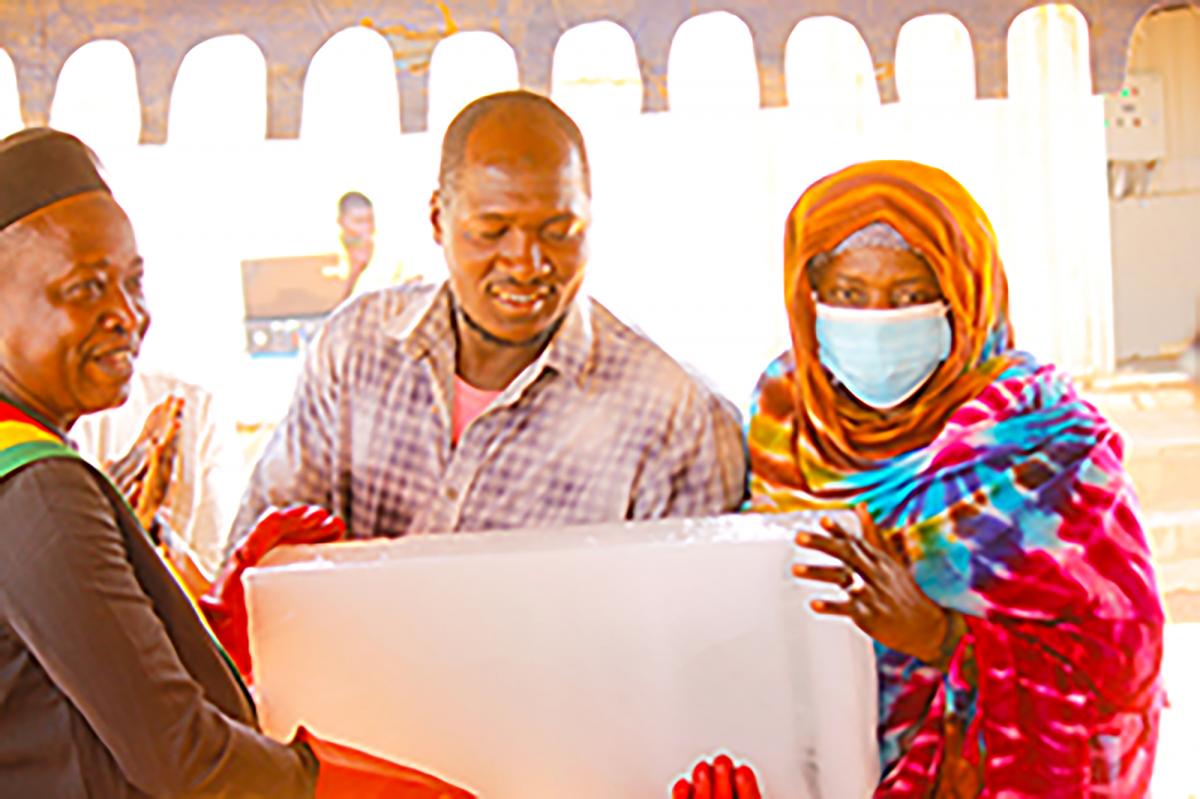
L’Unité de production de glace de Ségou au Mali produit sa 2000ème tonne de glace!
Nènè TRAORE | 01/03/2022
La mairie de la commune urbaine de Ségou en partenariat avec le Projet d'Appui à la Filière Halieutique (PAFHa+) a attribué à Ségou la 2000ème tonne de glace produite par l'Unité de production de glace de Ségou. La cérémonie a regroupé le Maire, les acteurs de la filière poisson frais de Ségou et les partenaires de mise en œuvre du PAFHa+. L'Unité de production de glace a été financée par le PAFHa+ pour le compte de la commune urbaine de Ségou qui a délégué sa gestion à un opérateur privé. Sa vocation est de contribuer à l'amélioration de la disponibilité de la glace en mettant à la disposition des mareyeuses de la glace de bonne qualité pour une bonne conservation du poisson frais. La cérémonie a permis aux parties prenantes de l'Unité de production de glace de témoigner des impacts positifs de l'équipement sur la filière poisson et sur la commune urbaine de Ségou. Du démarrage de sa production en avril 2020 jusqu'en janvier 2022 inclus, nous pouvons faire les constats suivants : la production cumulée de glace est de 2010 tonnes pour un chiffre d'affaires de 48 215 400 Fcfa et un résultat net de 15 711 944 Fcfa. Le gestionnaire emploie 4 personnes et a acheté 2 triporteurs pour assurer les livraisons de glace sur les marchés. Il a reversé sur la période à la Mairie de la commune urbaine de Ségou environ 6,7 millions Fcfa à titre de redevances.Les enquêtes de satisfaction ont montré que 67 % des mareyeuses de Ségou s'approvisionnent quotidiennement au niveau de l'unité, 92 % affirment que la faible disponibilité en glace en saison chaude (haute saison de pêche) a été fortement atténuée et a permis de mieux couvrir leurs besoins.
-
De nouvelles infrastructures sanitaires au service de la population au Burundi!
Donavine KWIZERA | 01/03/2022
Trois nouveaux bureaux de districts sanitaires tous neufs construits par la Belgique à travers le Programme d’appui Institutionnel au secteur de la santé (PAISS 5) exécuté par Enabel au Burundi ont été inaugurés du 22 au 23 février 2022 respectivement par la Ministre de la Santé publique et de Lutte contre le Sida ainsi que le Secrétaire Permanent au sein de ce Ministère. Les bureaux construits sont ceux des Districts Sanitaires de Kabezi - Rwibaga (Province Sanitaire de Bujumbura) et Bugarama (Province Sanitaire de Rumonge). Pour améliorer la qualité et l’accès des soins au Burundi, le PAISS 5 contribue à l’augmentation de la couverture sanitaire via une mise à niveau des infrastructures et équipements des formations sanitaires dans ses zones d’intervention. Ceci leur permet de fournir les prestations de soins de qualité conformément aux normes sanitaires en vigueur.La première cérémonie qui a eu lieu dans le district de Kabezi et a été marquée par la présence de la Ministre Dr Sylvie Nzeyimana, qui a apprécié vivement le partenariat, la solidarité et l’appui du Royaume de Belgique via Enabel, elle a souligné que Enabel à travers le PAISS 5 vient en appui aux institutions décentralisées du Ministère qui manquent d’infrastructures. Les travaux consistaient en la construction des bureaux pour les équipes cadres du district sanitaire mais également d’un dépôt pharmaceutique pour le stockage des médicaments devant alimenter les différents centres de santé du district sanitaire. En plus du bâtiment principal abritant les bureaux et le dépôt, une installation solaire a été installée afin d’autonomiser les bâtiments en énergie électrique. « Ce sont des beaux bâtiments, qui vont permettre à tout l’ensemble du personnel du bureau de district de travailler confortablement et d’être plus productifs car nous n’avions pas des bureaux propres » a confié le médecin chef de district. Pour Sanne De Mayer qui avait représenté l’Ambassade du Royaume de la Belgique dans ces cérémonies, « Ces bureaux vont permettre à l’ensemble du personnel de ces 3 districts de travailler dans des conditions optimales et d’améliorer la qualité de leurs prestations ». Les bénéfices de ces appuis auront un impact positif sur l’offre de soins des structures appuyées par les Bureaux des Districts Sanitaires et sur la population des aires de responsabilités des formations sanitaires évaluée autour de 572 851 habitants. L’ensemble des travaux et l’équipement mobilier a une valeur de 667.325 EUR. Depuis 2014, le PAISS 5 a aussi contribué entre autres à la mise aux normes de l’équipement et l’extension de certaines structures sanitaires, à l’électrification des centres de santé via des installations photovoltaïques, à l’informatisation des hôpitaux, et à construire une adduction d’eau potable pour 6.000 personnes, etc. Le Secrétaire Permanent du Ministère de la santé publique qui a représenté le Ministère dans la cérémonie d’inauguration des bureaux des districts sanitaires de Bugarama et Rwibaga a félicité Enabel et le royaume de Belgique pour son soutien dans la promotion de la santé de la population burundaise et plus encore pour sa contribution aux axes prioritaires du gouvernement ; ce qui donne des résultats très appréciés. Il a appelé les usagers de ces nouveaux bureaux à en faire bon usage.
-
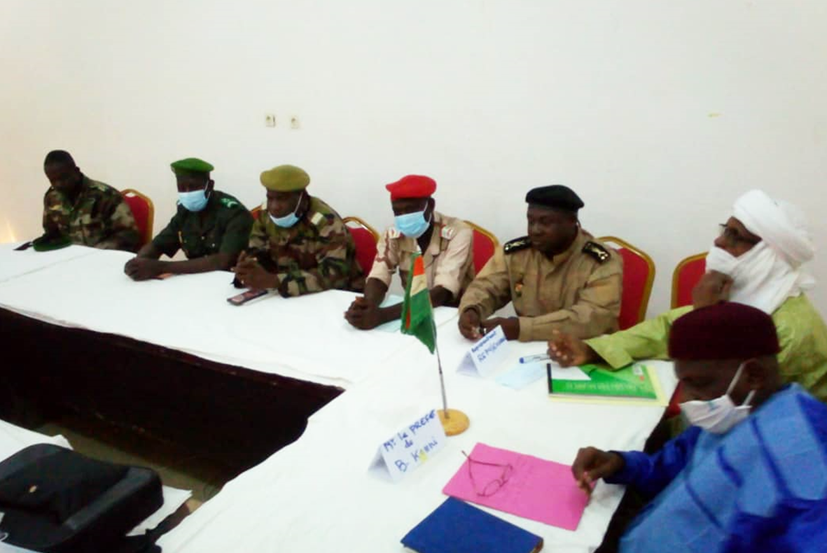
Au Niger, formation de la police rurale sur la gouvernance des ressources foncières pastorales
Halissa HASSAN DAN AZOUMI | 28/02/2022
Le projet Résilience Agro-Sylvo Pastorale Ouest Niger (REPO) d'Enabel a financé une formation des autorités administratives et coutumières ainsi que les commissions foncières et les Forces de Défense de Sécurité (FDS) sur l’exercice du pouvoir de police rurale. Cette dernière est un ensemble de pouvoirs détenus par des autorités administratives qui a pour objectif de prendre toutes mesures générales et individuelles nécessaires au maintien de l'ordre public, à la protection de l'espace rural, à la sécurité des activités rurales ainsi qu'au respect des normes légales et réglementaires.Les autorités de police rurale déterminent les règles générales applicables à la transhumance, aux parcours, au parcage et au transit des animaux. Elles assurent la coordination et la conciliation des droits des agriculteurs et des pasteurs notamment par la réglementation des couloirs de passage et des aires de pâturage. Cette formation s‘est déroulée en octobre 2021 pour les régions de Tillabéri et Dosso ; et en novembre 2021 pour la région de Tahoua. L’objectif de cette formation est d’outiller les gouverneurs, les préfets, les maires, les chefs traditionnels et les Secrétaires Permanents des Commissions Foncières ainsi que les FDS de la zone REPO pour une application effective de la police rurale dans la perspective de la prévention des conflits ruraux et une meilleure gestion et utilisation des ressources naturelles rurales.Elle a concerné 61 personnes réparties dans trois centres de formation et a été dispensée par deux formateurs expérimentés dont un sur les « enjeux du foncier pastoral et la gestion des ressources naturelles » et un sur « l’exercice de la police rurale pour une meilleure gouvernance des ressources foncières ».Pour mettre en œuvre les acquis de cette formation sur la police rurale, la Commission Foncière Départementale (FOCODEP) de Konni, sur financement du projet REPO a réalisé une mission de contrôle de mise en valeur des espaces pastoraux dans la commune de Alléla. A l’issue de cette mission et conformément à l’exercice du pouvoir de police rurale, le Préfet de Konni sur rapport de la mission de la COFODEP, a pris six arrêtés réglementaires portant interdiction de mise en culture d’une aire de pâturage et de trois couloirs de passage d’animaux par six (6) agriculteurs. Ces arrêtés sont des actes administratifs qui sont des moyens et outils dont disposent, les autorités en charge de l’exercice du pouvoir de police rurale.
-
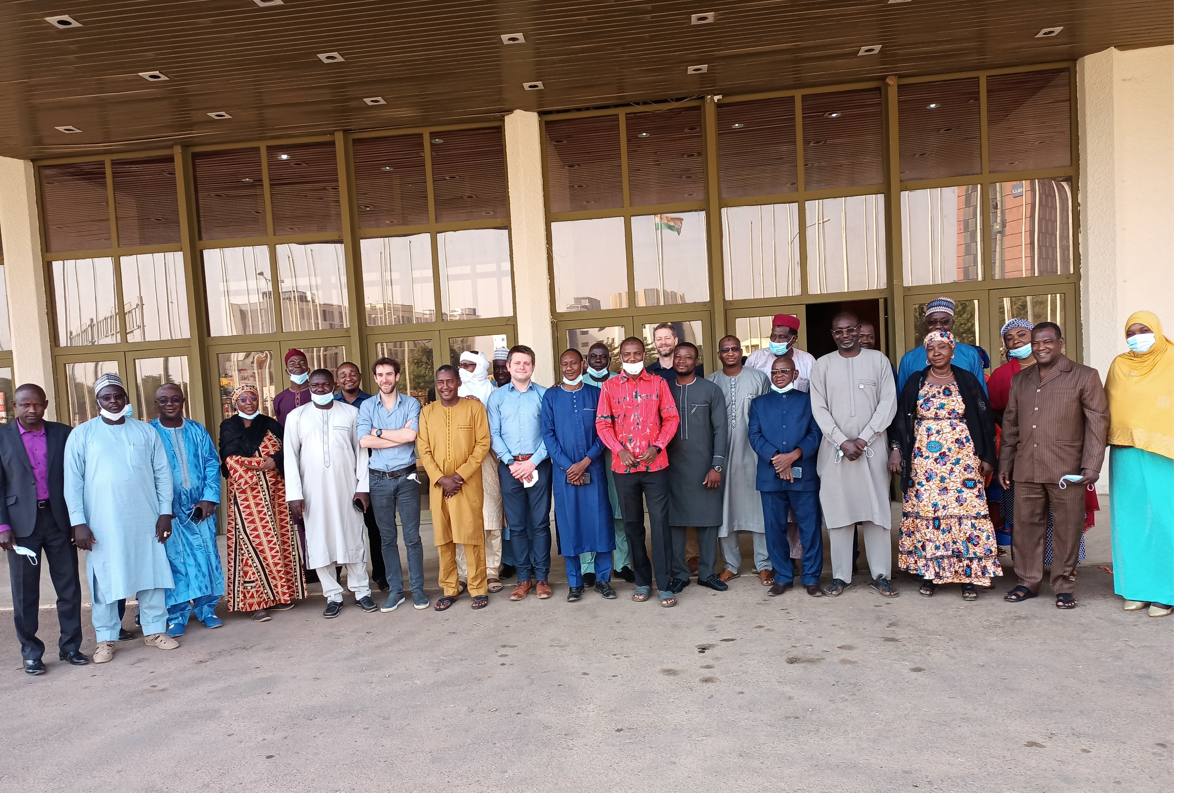
Enabel et VITO collaborent pour soutenir les pasteurs et agropasteurs du Niger
Halissa HASSAN DAN AZOUMI | 22/02/2022
Le projet REPO de Enabel (Résilience Pastorale Ouest Niger), financé par l’Union européenne, a appuyé la Direction du Développement Pastoral (DDP) du Ministère de l’Élevage afin de favoriser la concertation des partenaires sur le système de suivi de la quantité et de la qualité de la biomasse fourragère (production de matière végétale appétable par le bétail). Cet atelier visait notamment l’établissement d’une feuille de route pour la DDP et ses partenaires dont l’objectif est de définir un outil innovant de suivi de la biomasse fourragère sèche. Cela devrait contribuer à terme à obtenir un bilan fourrager régulier même en saison sèche, permettant alors de meilleures décisions pour la gestion du bétail.En effet à l’heure actuelle il n’existe pas de méthodologie concluante d’analyse des images satellitaires permettant cela. VITO (Institut de recherche Belge) au travers d’un accord de coopération avec Enabel, a participé à l’atelier et sera en charge de l’élaboration de cet outil. L’atelier s’est tenu le 16 février 2022 au Palais des Congrès de Niamey et a regroupé une trentaine de participants dont le Ministère de l’Élevage, le Système d’Alerte Précoce de Crise Alimentaire, le Dispositif National de Gestion et de Prévention des Crises Alimentaires, l’Institut National de Recherche Agronomique du Niger, le Centre régional d’Agro-Hydro-Météorologie Agrhymet, ACF (Action Contre la Faim), VSF (Vétérinaires Sans Frontières) et d’autres partenaires importants. La journée a permis de faire la situation sur le système de suivi et d’évaluation de la biomasse fourragère en général et plus particulièrement à l’aide d’images satellitaires et drones et de dégager les besoins dans le domaine. Les travaux ont permis de définir les grandes lignes d’une feuille de route visant l’élaboration d’une méthodologie de l’évaluation de la biomasse fourragère sèche. L’assemblée a défini la composition d’un comité scientifique multi acteurs qui sera chargé de valider la méthodologie en permettant une bonne concertation entre les acteurs.
-
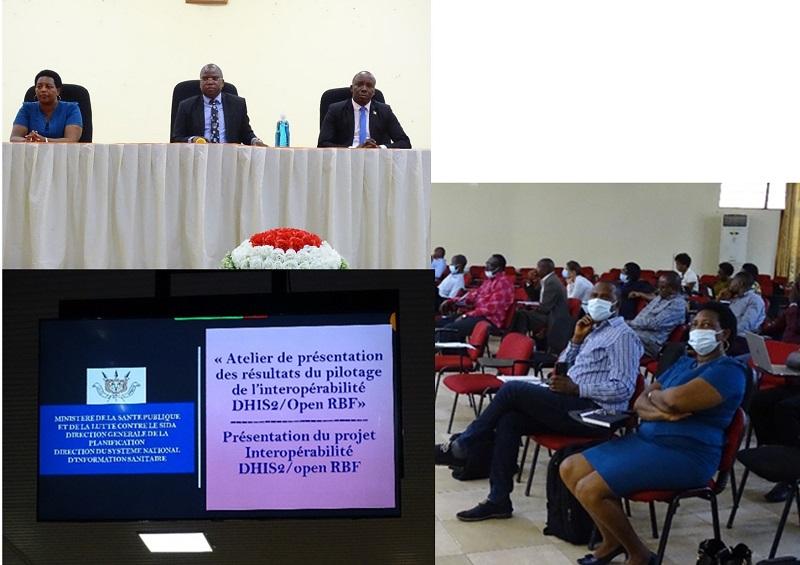
Burundi : Le Ministère de la Santé publique et de la Lutte contre le Sida s’engage à la digitalisation du secteur de la santé
Jean BIRONKWA | 22/02/2022
Le Ministère de la Santé publique et de la Lutte contre le Sida à travers sa Direction du système national d’information sanitaire en collaboration avec Enabel a organisé un atelier d’évaluation des résultats de la phase pilote de digitalisation de la collecte des données de vérification quantité et qualité dans le cadre du financement basé sur les performances.Cette phase pilote a été réalisée dans les provinces sanitaires de Muramvya, Cankuzo et Kirundo depuis novembre 2021. Il s’agit d’une étape dans un processus global qui vise une interopérabilité entre la plateforme digitale DHIS2 utilisée pour la collecte des données du système national d’information sanitaire et la plateforme digitale OpenRBF utilisée pour la collecte des données liées à la gestion du système de financement basé sur les performances. Le Projet d’Appui au Système National d’Information Sanitaire mis en œuvre par Enabel sur financement du Royaume de Belgique a pour objectif d’améliorer la disponibilité en temps opportun d’informations sanitaires pertinentes, fiables et de façon pérenne. Dans le but de mieux cibler les goulots d’étranglements auxquels le système de santé fait face, le projet met en priorité l’échange des données entre les applications informatiques utilisées dans le secteur de la santé afin d’éviter l’incohérence des données qui conduisent à la prise de décisions sur la qualité des soins, les chaines d’approvisionnement, la satisfaction des clients et sur le financement des services de santé. En même temps, le Programme d’Appui au Système de Santé à travers l’outil de financement basé sur les performances financé par l’Union Européenne appui l’extension de l’outil GMAO (Gestion Maintenance Assistée par l’Ordinateur) qui permet la gestion des équipements informatiques et infrastructures du secteur de la santé. Dans son discours d’ouverture, le Secrétaire Permanent au Ministère de la Santé Publique et de la Lutte contre le Sida, a signalé que la digitalisation du système de santé est une priorité pour le Ministère et que personne ne restera en arrière. « Une fois le projet réussi, le MSPLS et ses partenaires au développement don’t Enabel auront une plus-value par rapport au temps mis pour la vérification des données quantité et qualité par les comités provinciaux de vérification et de validation, la réduction du volume des imprimés, le renforcement du système national d’information sanitaire et le financement basé sur la performance (FBP) à travers l’assurance de la cohérence entre la Base de Données du SNIS et celles de la Base de Données du FBP », a particulièrement souligné le représentant du Ministre lors de cet atelier. Selon le Médecin Directeur du Système National d’Information (DSNIS) Dr Nahayo Anaclet, ce projet vient répondre à certains défis déjà identifiés dans la collecte des données. Pour lui « Les FOSA rapportent les données mensuellement dans les canevas DHIS2 du SNIS mais les données rapportées dans le PBF ne sont pas cohérentes à celles rapportées au SNIS. Le projet d’interopérabilité entre la plateforme du SNIS et celui du FBP permettra en tout état de cause, le transfert des données déclarées de la Base de données du SNIS vers la Base de données du FBP et inversement le transfert des données vérifiées et validées de la Base de données du FBP vers la Base de données du SNIS », a signalé le Directeur du SNIS. Mise à l’échelle des résultats de la phase pilote Les participants à cet atelier ont eu l’occasion d’échanger sur les résultats obtenus avec l’expérience pilote et ont trouvé opportun d’étendre ce projet à 15 autres provinces du pays. Cette extension se fera avec l’appui technique et financier du Programme d’Appui au Système de Santé à travers l’outil de financement basé sur la performance(PASS-FBP) mis en œuvre par Enabel sur financement de l’Union Européenne. Un renforcement des capacités des gestionnaires des différents outils mis en en place sera aussi réalisé pour assurer la pérennisation des acquis.
-
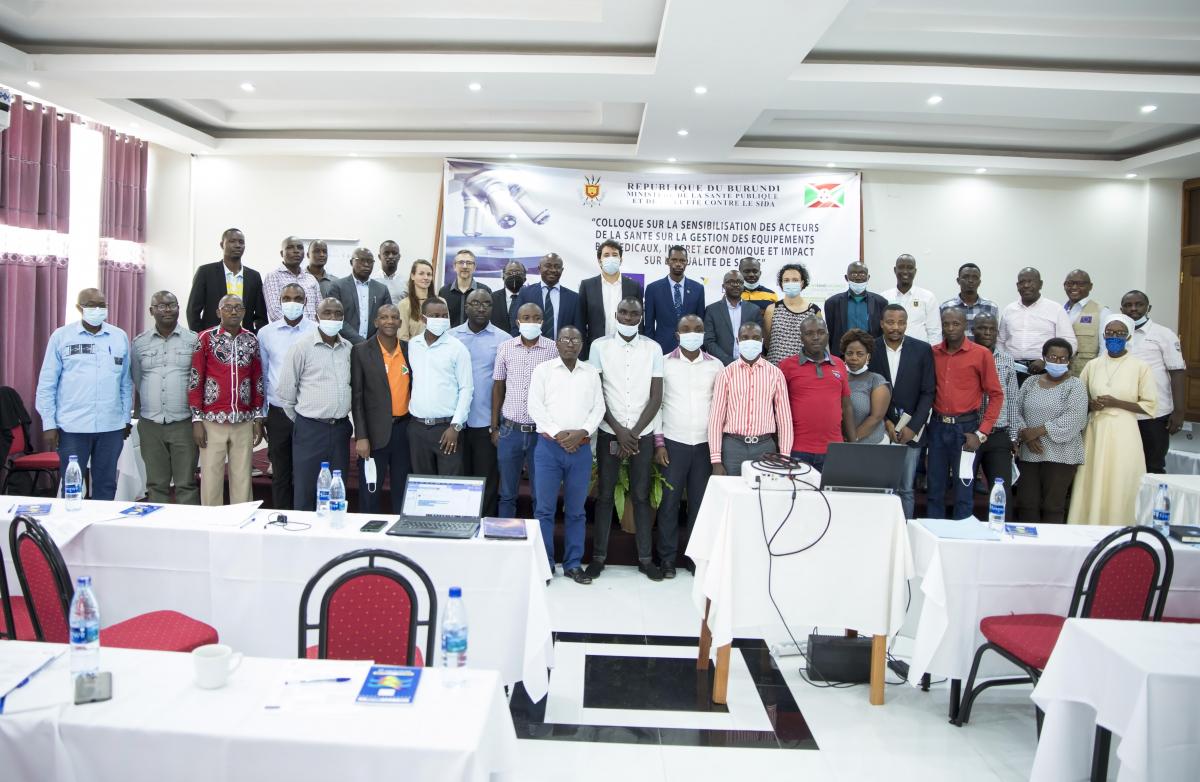
Burundi: La gestion des équipements biomédicaux, au cœur d’un colloque à Bujumbura
Jonas Eric UWIZERA | 22/02/2022
Les soins de santé sont en pleine évolution. Deux facteurs y jouent un rôle capital, à savoir, les ressources humaines et un équipement médical fiable. Un équipement fonctionnel de qualité est crucial pour fournir des services de santé de qualité et reste un challenge majeur. La gestion du cycle de vie des dispositifs médicaux (de l'achat à la mise en fonction) fait partie des éléments constitutifs du système de santé proposés par l'OMS. Mais en réalité, la gestion rationnelle des équipements est la plupart du temps négligée. Les équipements (et infrastructures) sont donc négligés par manque d’un système de maintenance adéquat et adapté. Cela a des conséquences non seulement sur la qualité des services, mais également sur le budget de la santé.Pour faire face aux conséquences que pourraient occasionner l’absence de maintenance des équipements médicaux, le projet PAISS 5 d’Enabel a mis en place un budget dédié pour la maintenance, qui représente 10% de l’investissement total, soit un montant de 1.1 millions d’Euros sur les 11 millions d’Euros dédiés aux infrastructures et équipements. D’autres projets d’Enabel concourent dans cet objectif notamment le PAISS 4 et le PASS FBP qui ont assuré et assurent aujourd’hui la digitalisation de la gestion du patrimoine hospitalier à travers la maintenance et le monitoring des équipements biomédicaux via le logiciel GMAO et la formation des techniciens qui gèrent les équipements fournis.Au travers des échanges et partage d’expériences pendant les 2 journées, du 2 au 3 février 2022, le colloque a permis de sensibiliser les praticiens de la santé, les gestionnaires et les décideurs à la nécessité d’une gestion rationnelle de la maintenance des équipements biomédicaux en démontrant l’impact sur l’amélioration de la qualité et de la quantité des prestations de soins. Lors des restitutions des travaux de groupe, l’accent a été mis sur l’importance de la prise en compte de tous les éléments qui composent la stratégie de maintenance décentralisée implémentée avec l’appui d’Enabel dans les 5 provinces d’intervention du PAISS 5 et ce, depuis 2017.Le Ministère de la santé publique et de la lutte contre le Sida a encouragé dès lors ses partenaires et les responsables des formations sanitaires à s’inscrire dans cette stratégie en investissant : (i) dans le recrutement de techniciens de maintenance A2 dans les districts sanitaire en veillant à leur renforcement des capacités, (ii) dans la mise à niveau du plateau technique des formations sanitaires et des ateliers de maintenance des districts, (iii) en favorisant l’utilisation du logiciel GMAO aujourd’hui utilisé sur l’ensemble du territoire national.
-

Mali: Visite de chantier de la station de traitement de boues de vidange par les autorités régionales
Nènè TRAORE | 21/02/2022
Le jeudi 17 février 2022, le Gouverneur de la région de Koulikoro accompagné des autorités communales et des services techniques ont visité le chantier de la future station de traitement de boues de vidange de Koulikoro. L'objectif était de s'enquérir de l'évolution des travaux dont la fin est prévue pour juin 2022. Initié dans le cadre du projet PEPAK, 53 000 habitants profiteront de cette infrastructure une fois les travaux terminés.A travers la réalisation de cette infrastructure, le PEPAK veut apporter une innovation de taille dans le domaine de l'assainissement au Mali.
-
Burundi: Démarrage d’un partenariat public-privé innovant dans le secteur de la construction
Donavine KWIZERA | 18/02/2022
Ce jeudi 10 février 2022 et pour la toute première fois, le projet ACFPT d’Enabel et l’un des centres de formation partenaires, le Centre de Formation Professionnelle de Kanyosha à Bujumbura, viennent de signer un protocole d’entente direct avec une grande entreprise de construction internationale, AMA Construction. Ce partenariat direct vise le renforcement et l’amélioration des compétences techniques des lauréats et des formateurs de la filière Bâtiment Travaux Publics ainsi que le recrutement de la main d’œuvre déjà formée par le CFP Kanyosha sur leurs chantiers. L’entreprise AMA Construction est une société d’origine tunisienne spécialisée dans les bâtiments, qui éxécute de grands chantiers de construction au Burundi (nouveau siège de la Banque de la République du Burundi, nouveau complexe commercial de la Bancobu, siège de l’Office Burundais des Recettes, siège de la Coopérative d’Epargne et de Crédit pour l’Auto-Développement de Militaires). Cette entreprise est intéressée à contribuer au renforcement et au développement de la main d’œuvre qualifiée au niveau local et les jeunes lauréats issus ces dernières années des filières bâtiment du CFP Kanyosha recevront non seulement des formations de perfectionnement mais intégreront aussi progressivement certains chantiers de l’entreprise AMA Construction en cours de réalisation. C’est une excellente opportunité pour le Centre de Formation Professionnel Kanyosha et surtout pour les lauréats qui vont bénéficier de cette expertise technique novatrice de l’entreprise de construction et d'opportunités d’emploi sur leurs chantiers.
-

La communauté WOMEN IN TECH à la rencontre des filles et femmes du Bénin
Reece-hermine ADANWENON | 18/02/2022
Du 7 au 12 février 2022, la communauté Women In Tech (WIT) a organisé sa première tournée nationale d’échange avec les filles et les femmes du Bénin autour du thème « Réduire les inégalités du genre dans le numérique au Bénin : Donner les moyens aux filles et aux femmes d’exceller dans le numérique. » Dans le cadre de cette tournée, la communauté a parcouru 8 villes du Bénin : Nikki, Parakou, Savalou, Bohicon, Abomey-Calavi, Lokossa, Cotonou et Porto-Novo. Plus de quatre cents (400) filles et femmes ont été impactées lors de cette tournée. L’objectif visé par cette tournée est de sensibiliser les filles et les femmes aux métiers du numérique et de recenser les difficultés réelles de ces dernières à évoluer dans le domaine du numérique. A chaque étape, les participant.e.s ont montré leur intérêt aux métiers du numérique et énuméré leurs besoins afin de prendre leur place et d’exceller dans les métiers du numérique. Les besoins majeurs énumérés lors de ces sessions sont entre autres : · La création de centre de formations des métiers du numérique ; · La mise en place de projets concrets pour permettre l’accès au numérique des jeunes filles depuis leurs bas âges ; · L’organisation des séances de sensibilisation sur l’impact du digital dans l’épanouissement de la femme ; · L’octroi de bourse de formation aux jeunes filles pour se former dans le secteur du digital. Ces différents besoins énumérés permettront à la communauté Women in Tech (WIT) d’élaborer son plan d’action annuel. Ce qui permettra au final d’améliorer l’environnement de l’économie numérique au Bénin à travers l’appui à la consolidation des initiatives en faveur des femmes. En effet, la communauté WIT est un réseau de femmes professionnelles des métiers du numérique, d’entrepreneurs agissant dans le secteur du numérique, de structures d’accompagnement à l’entrepreneuriat innovant ayant le volet genre dans leurs activités. Sa vision est de : « Contribuer à réduire les inégalités du genre dans le numérique au Bénin et en Afrique, en bâtissant un réseau influent et diversifié d’acteurs et d’actrices du numérique et/ou de l’entrepreneuriat ». Ses principales missions sont : · Inciter les filles et les femmes à l’usage du numérique, · Faciliter l’accès des jeunes filles et femmes aux métiers et opportunités du numérique, · Garantir le maintien et la progression des professionnelles exerçant les métiers du numérique. Pour en savoir plus sur la communauté Cliquez ici Avec le développement du numérique, de nouvelles opportunités d’activités s’offrent aux femmes afin de garantir leur autonomisation et d’impacter positivement leurs différentes communautés. Dans ce sens le projet Digiboost don’t l’exécution est assurée par Enabel au Bénin met un accent particulier sur la consolidation des initiatives en faveur des femmes. C’est ainsi qu’au titre de l’année 2021, le projet Digiboost a œuvré à la consolidation de la communauté Women In Tech. Le projet Digiboost est financé par l’Union Européenne, dans le cadre du Programme pour la Compétitivité en Afrique de l’Ouest sur le 11è FED (2014-2020), pour accompagner le Ministère du Numérique et de la Digitalisation (MND) de la République du Bénin dans le déploiement de ses ambitions en matière de développement de l’économie numérique.
-
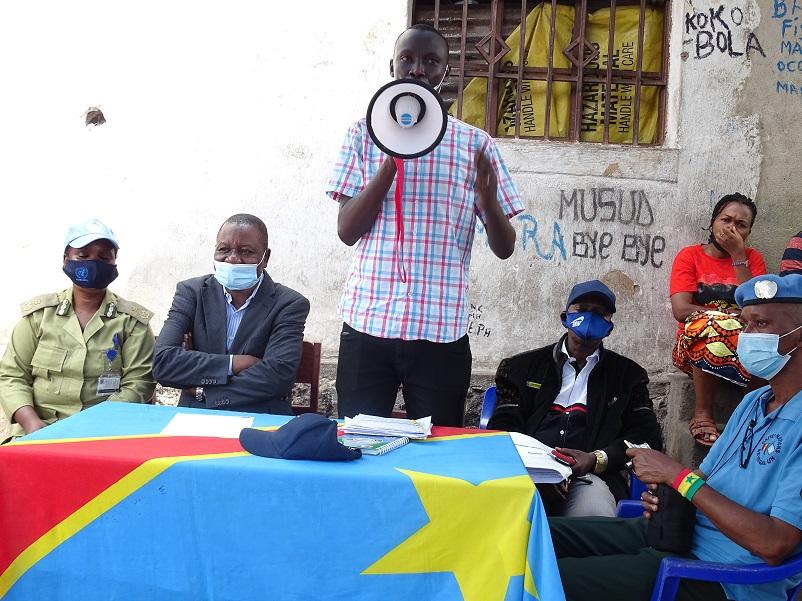
Uvira, RDC : Quand les travaux d’assainissement de la prison améliorent le bien-être des prisonniers et la protection des eaux du lac Tanganyika
Rodrigue NIYONGABO | 17/02/2022
Le 11 février 2022, sous un ciel ensoleillé, l’équipe du projet Latawama a procédé au lancement officiel des travaux d’assainissement de la prison d’Uvira, en collaboration avec la MONUSCO et en présence du maire adjoint de la ville d’Uvira. Le projet Latawama équipera les différentes cellules communes de toilettes et procédera à la réhabilitation des toilettes externes et à la construction de nouvelles douches. Les toilettes seront connectées à un nouveau bio-digesteur de 50 m³qui alimentera en gaz les cuisines et évitera la combustion de bois. En complément, l’alimentation en eau sera renforcée par la collecte et le stockage des eaux pluviales destinées aux usages sanitaires. Les eaux « grises » issues des douches et des cuisines seront traitées par une station d’épuration. Ces différents travaux concordent vers un double résultat : améliorer les conditions sanitaires des prisonniers et contribuer à limiter l’impact de la prison sur l’environnement et la qualité des eaux du lac. En cette matinée, la cour était animée, beaucoup de mouvements de va-et-vient, des brouhahas dans l’attente du lancement des travaux. Le représentant des prisonniers Muhanuka Mashali Moise, emprisonné depuis 12 ans à la prison d’Uvira, a accepté de témoigner sur un des aspects qui lui tient à cœur : l’absence des toilettes à l’intérieur des cellules communes. Ça fait des années que je vis dans cette prison. La vie n’y est pas facile. Les prisonniers défèquent dans les seaux. On appelle ça « Mwami ». Des prisonniers souffrent de la diarrhée et des maladies de la peau. Dans les cellules, il y a des odeurs nauséabondes avec le risque de dislocation des seaux sous l’effet de la chaleur et la biodégradation des excreta. Chaque matin, les prisonniers transportent ces déchets en dehors de cellule, ce qu’ils appellent communément « Kubeba mwami ». Moise explique ensuite que « Ici les prisonniers doivent être dans les cellules à partir de 18 h et sortent à 6h du matin. Vous savez que tous les êtres humains disposent des besoins physiologiques. C’est normal qu’on ait envie de se soulager durant cette période. Avec l’absence des toilettes, la solution à notre portée est uniquement constituée des seaux. Quand nous avons entendu parler du projet, nous avons tressailli de joie. La construction des latrines et la collecte des eaux pluviales vont permettre de résoudre le problème qui hante les prisonniers, a précisé monsieur Muhanuka Mashali ». Cette situation est confirmée par le Directeur de la prison, Emmanuel Kabwe qui parle d’un véritable problème. Lors des cérémonies de lancement des travaux d’assainissement en présence des prisonniers, il affirme que les travaux initiés par le projet LATAWAMA mettront fin à la pratique de « Kubeba Mwami », soit le fait de transporter les excreta chaque matin en dehors des cellules. Emmanuel Kabwe, a précisé que le bio digesteur va contribuer à la production d’énergie permettant la cuisson et la protection de l’environnement : « Il est difficile de trouver du bois de chauffage dans une ville déboisée et se trouvant dans une vallée et traversée par les rivières alimentant le lac Tanganyika ». Un autre fait marquant des travaux d’assainissement de la prison d’Uvira, c’est la participation des prisonniers dans les travaux. Les prisonniers maçons et aide-maçons hommes et femmes disposant d’une technicité seront mis à contribution dans les travaux d’assainissement de la prison d’Uvira. C’est une bonne nouvelle pour les prisonniers. Les actions d'assainissement viennent résoudre un problème réel selon Emmanuel Kabwe dans cette institution qui compte environ 1200 prisonniers dont 10 femmes et 3 nourrissons. Mr Kifara Kapenda Kiky, maire adjoint de la ville, a participé aux cérémonies de lancement des activités d’assainissement de la prison d’Uvira et affirme que les actions d’assainissement de la prison d’Uvira vont améliorer sensiblement la vie des prisonniers « Personne ne voudrait être dans cette situation » affirme-t-il. Il salue l’apport du projet LATAWAMA mis en œuvre par Enabel, sur financement de l’Union européenne.
-
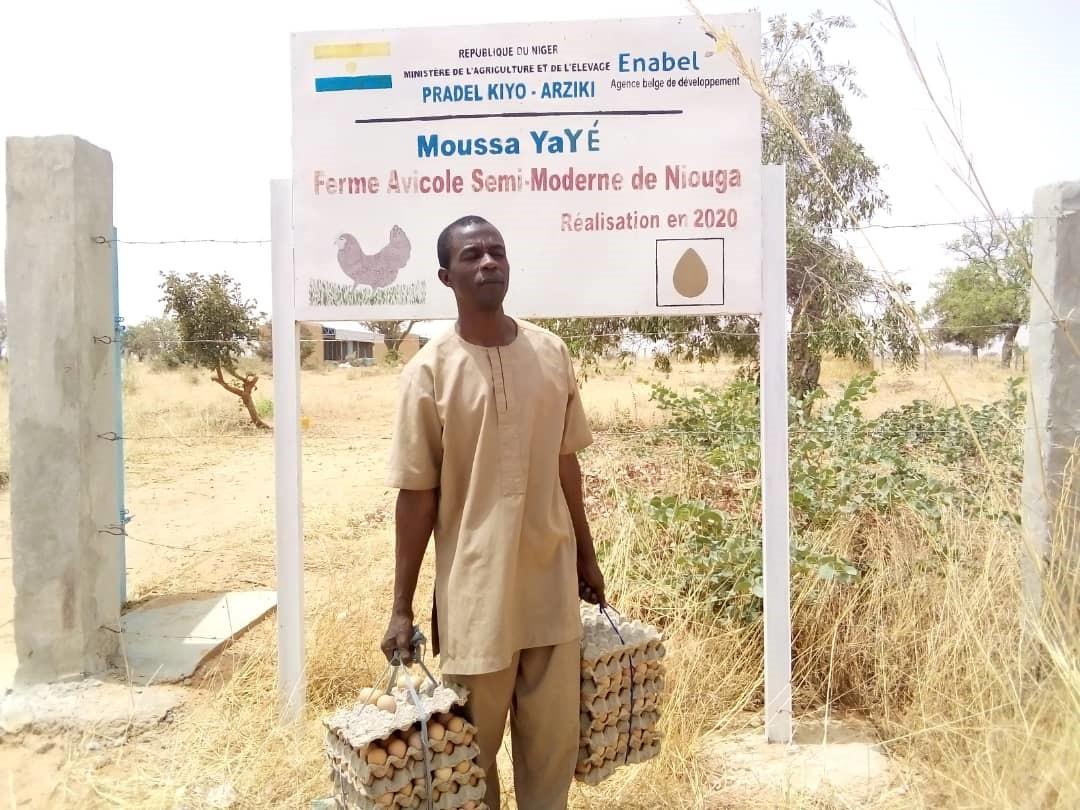
Enabel soutient l’amélioration de l’aviculture semi-moderne au Niger
Halissa HASSAN DAN AZOUMI | 16/02/2022
Au Niger, l’aviculture est une réponse aux problèmes d’approvisionnement des villes et campagnes en œufs de table et en viande de volaille pour contribuer à l’amélioration de la sécurité alimentaire et nutritionnelle. L’aviculture semi-moderne au Niger est une activité rentable, source de revenus et d’emploi pour les jeunes et les femmes. Cependant, des mesures importantes doivent être prises pour minimiser les risques liés au métier de l’aviculture pour les jeunes promoteurs. Le Ministère de l’Élevage et l’Agence belge de développement (Enabel) ont mis en œuvre le Programme d’Appui au Développement de l’Élevage – PRADEL « Kiyo Arziki » (Élevage, Source de Richesse) sur une durée de 60 mois de 2018 à 2022 dans les régions de Dosso et de Tahoua. L’objectif général du programme est de renforcer la sécurité alimentaire, la résilience et les revenus des populations liées à un élevage familial. Au titre de son axe 1 d’intervention, le PRADEL s’est employé au développement des filières/chaînes de valeur d’élevage, avec l’appui à l’entrepreneuriat par la création et la consolidation des Micro, Petites et Moyennes Entreprises (MPME) de production, de transformation et de commercialisation des produits et sous-produits de l’élevage au sein des filières/chaînes bétail/viande, lait/produits laitiers et aviculture. L’aviculture au Niger L’aviculture est une activité pratiquée par près de 87 % de la population active. Elle constitue une source d’aliment (viande, œufs) et de revenus pour la population. Elle contribue efficacement à assurer la sécurité alimentaire durable et la réduction de la pauvreté. Au Niger, on distingue deux types d’élevage de volailles : l’élevage traditionnel ou de basse-cour (pratiquée généralement dans les concessions) et l’élevage moderne des fermes avicoles. La production avicole au Niger, longtemps dominée par les pratiques traditionnelles, se transforme progressivement autour des centres urbains pour devenir une véritable activité économique. L’aviculture traditionnelle représente 98 % contre 2 % pour l’aviculture moderne. La promotion de l’aviculture a été portée par l’État à travers la création de stations avicoles depuis 1962. Aujourd’hui, l’aviculture fait l’objet d’un regain d’intérêt de la part de toutes les couches socioéconomiques, des pouvoirs publics et des partenaires techniques et financiers. L’engagement politique du gouvernement pour la filière avicole a été poursuivi et renforcé par sa politique de promotion et de développement du sous-secteur de l’élevage à travers la mise en œuvre de diverses stratégies. C’est ainsi que le PRADEL a prévu, en plus de l’appui au développement de l’aviculture depuis 2018 pour booster la production avicole dans les régions de Dosso et de Tahoua, un soutien à des promoteurs individuels et collectifs identifiés suite à des appels à propositions. Ces promoteurs sont tous des professionnels dans le domaine, qui ont été aidés pour rendre leur activité plus performante et servir de modèle aux autres. Ils ont reçu des services d’appui-conseil en élaboration de plan d’affaires, en gestion technico-économique et en santé animale pour bien mener leurs activités d’élevage en aviculture améliorée. Mise en place des entreprises pilotes modèles en aviculture Trois promoteurs ont été retenus pour renforcer leurs unités d’élevage en aviculture améliorée au niveau de Dosso et de Tahoua. Pour mettre en place ces modèles en aviculture améliorée, il a été procédé à l’acquisition et l’installation des infrastructures, équipements et matériels d’élevage (poulaillers, abreuvoirs, mangeoires et autres petits matériels) ; l’acquisition des intrants zootechniques (l’achat des sujets pintades locales et des races Galor, poulettes de ponte), d’aliments pour la volaille et de produits vétérinaires ; et la mise en place d’un dispositif d’appui-conseil. Il s’agit d’un conseil en entrepreneuriat et zootechnie à travers le recrutement de prestataires privés de services de conseil technique et de gestion. À travers la mise en œuvre de ces entreprises pilotes en aviculture, le PRADEL a pu renforcer les capacités techniques et économiques des promoteurs grâce à la mise en place d’investissements d’élevage et au développement de compétences commerciales, en entrepreneuriat et en gestion. Les projets d’entreprises pilotes bénéficient aussi d’actions de renforcement des capacités sous forme de coaching et cela a été utile aux promoteurs, surtout à ceux des projets pilotes modèles qui ont sensiblement modifié leur mode de gestion. Les entreprises avicoles modèles, appelées aussi Projets Pilotes Modèles (PPM) d’aviculture de première génération, ont été érigées en fermes avicoles semi-modernes. L’aviculture est considérée comme un métier à risque. Il s’avère donc nécessaire d’adapter les actions de renforcement des capacités aux besoins d’appui pour une professionnalisation technique et de management des promoteurs sur les thématiques de gestion commerciale, de prise en charge de la santé, d’accès aux financements (élaboration de plans d’affaires) et de création d’affaires. Des actions d’information/sensibilisation, de lobbying et de plaidoyer doivent être menées auprès des décideurs, des bailleurs de fonds et des institutions financières pour que les entreprises puissent accéder aux crédits et aux financements. Il serait aussi intéressant de favoriser les relations d’affaires afin d’encourager le professionnalisme et la compétitivité entre les acteurs du secteur.
-
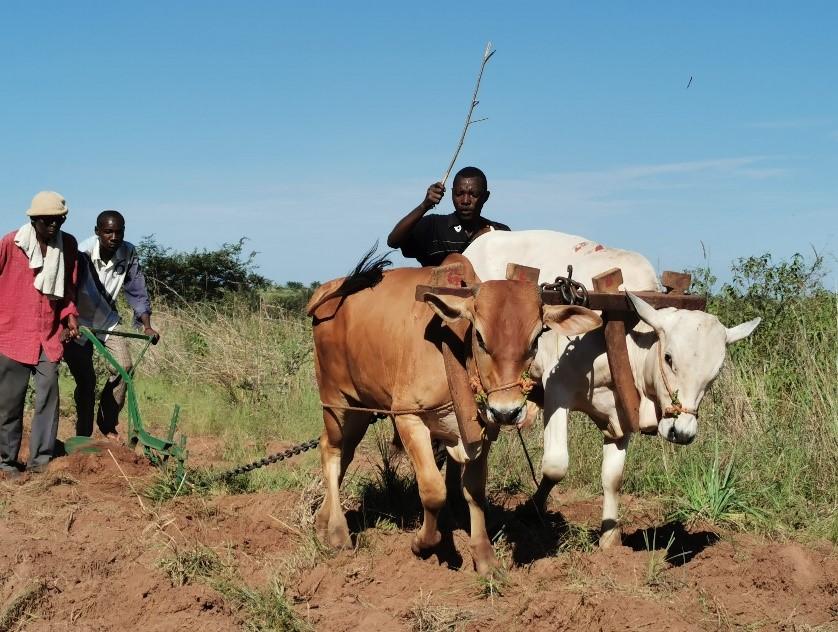
RDC: La redynamisation de la culture attelée par la traction bovine
Grâce MALI FAIDA | 14/02/2022
En collaboration avec deux acteurs-clés du territoire de Ngandajika que sont l’Action Intégrée pour le Développement de Ngandajika (AIDN) et l’Institut Technique Agricole et Vétérinaire de Tshioji (ITAV), Enabel (PRODAKOR et EDUKOR) poursuit son accompagnement dans le territoire de Ngandajika en Province de Lomami pour la redynamisation de la culture attelée par la traction bovine. Cette redynamisation s’inscrit dans une logique de maintien et de promotion de la culture attelée qui est à la fois avantageuse pour l’environnement et pour le développement économique des ménages/ agriculteurs qui la pratiquent. Aussi la logique se veut totalement inclusive du genre en donnant l’opportunité aux femmes-agricultrices du territoire de Ngandajika de se positionner pour la pratique de la culture attelée par la traction bovine ; un moyen d’allègement des tâches agricoles. Dans ce cadre, sept (7) porteurs de projet (3 femmes et 4 hommes) ont été formés entre Juin et Août 2021 par l’incubateur rural de Ngandajika en gestion financière, dans l’élaboration de business plan et de plan de remboursement des équipements mis à leur disposition via le mécanisme de location-vente. Puis, en décembre 2021, les porteurs de projet ont reçu une formation théorique et pratique en traction bovine axée sur leur responsabilité vis-à-vis de leurs activités et les soins particuliers qui doivent être apportés à chaque paire de bœufs pour une bonne activité champêtre. Depuis le mois de Janvier 2022, les sept (7) porteurs de projet pratiquent, chacun sur sa parcelle, la culture attelée. Un suivi très rapproché (agronomique et technique pour les outils de traction bovine) est planifié pour cette année 2022 avec chaque porteur de projet ainsi que des ateliers de partage d’expérience pour permettre une promotion réelle de la culture attelée par la traction bovine dans le territoire de Ngandajika.
